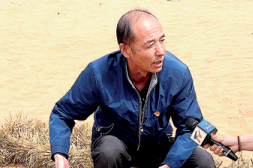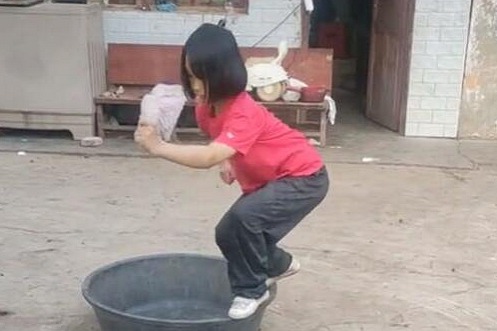Revisiting an old squeeze
Ancient oil press that brought business success in 'land of fish and rice'

Editor's Note: Using a blend of words and visuals, this series explores unique communities and reveals the heart of China through food, architecture, craftsmanship, landscapes and traditions.

In the Wuhu Museum in Anhui province, there is an old and large wooden device for producing edible oil that originated in the late Qing Dynasty (1644-1911).
The device represents an important aspect of local people's culinary culture, according to Chen Lin, the museum's deputy director.
Wuhu, located on the banks of the Yangtze River, was one of the earliest inland ports to open to foreign trade in the late Qing Dynasty.
"Merchants from all over the country and abroad gathered here, bringing with them a fusion of culinary cultures, which led to the creation of many delicacies and a high demand for cooking oil," Chen said.
The oil needed to make these delicacies was produced using a wood-pressing technique that has a history of over 1,600 years, Chen explained, pointing to the old device. The oil press, approximately 5 meters long, 2 meters wide, 1.5 meters high and weighing about 2 metric tons, was donated by Yiranxiang, a company in the city's Wanzhi district. The company still has dozens of such ancient oil presses that continue to produce oil every day, mainly with rapeseed.
In the company's workshop, the workers start as early as 5 am — a tradition for generations.
The entire process takes four to six hours and involves several steps, including seed roasting, grinding, steaming, cake wrapping, loading the press, pressing and settling.
Each step relies on skilled craftsmanship, primarily acquired through hands-on practice, according to Xu Zuowen, founder and chairman of the enterprise.
"In the past, oil pressing workshops were usually located near markets. By the time the markets were filled with shoppers, the aroma of freshly produced rapeseed oil had already wafted through every corner," Xu said.
In the late Qing Dynasty, Xu's great-grandfather worked in an oil workshop and passed the skills to his grandfather. The family's business was then interrupted for many years by wars and social unrest.
After the founding of the People's Republic of China, Xu's father resumed the family business.
Xu grew up watching the adults make oil, developing a deep emotional connection to the craft. After years in the profitable construction business, he began collecting presses from across the country and founded Yiranxiang.
Wuhu has long been known as the "land of fish and rice" with a history of prosperous agriculture. Local farmers have extensively cultivated oil crops, providing favorable conditions for the development and preservation of the wooden oil pressing technique.
Rapeseed oil has always been the most important cooking oil for the locals. In terms of planting area and production, China is the world's largest producer of rapeseed, followed by countries such as Canada and India. In China, the Yangtze River Basin is the largest planting area.
In 2019, Xu was recognized as a representative inheritor of the Wuhu wood-pressed oil technique, a provincial-level intangible cultural heritage item, by the Anhui Department of Culture and Tourism.
Two years later, Yiranxiang was listed as a provincial-level intangible cultural heritage inheritance base.
Lyu Yi, an expert from the Wuhu intangible cultural heritage protection center, said, "We have conducted rescue documentation and organization of basic information on wood-pressed oil techniques, including physical objects, texts and images, and have also cultivated a team of inheritors."
Contact the writers at [email protected]
- Revisiting an old squeeze
- Rise in foreign trademark registrations
- Record-breaking project still bringing manifold benefits
- New rocket marks debut mission of launch center
- China launches artificial intelligence platform to boost judicial efficiency
- Relocated communities make most of Three Gorges' funding




































